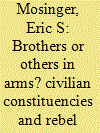| Srl | Item |
| 1 |
ID:
168932


|
|
|
|
|
| Summary/Abstract |
What explains the causes and outcomes of rebel factional struggles? Existing explanations focus on exogenous and material factors that disrupt rebel organizations’ internal processes. Yet rebel groups succumb to infighting and organizational splinters even in the absence of external shocks. In this article I present an endogenous and social theory of rebel factional struggles, in which leadership disputes result from a shifting balance of loyalties within a rebel organization. In my model, rival rebel leaders cultivate the loyalty of two types of networks, recruitment networks and operational networks, which serve as power bases to initiate leadership struggles, launch coups, or split organizations. I build my theory through a case study of Nicaragua’s Frente Sandinista de Liberación Nacional (FSLN), which splintered into three factions in 1975–76. Drawing on an original network dataset of FSLN commanders, I trace how the organization’s network structure changed over time, spurring disputes over rank-and-file fighters’ loyalties that tore the FSLN apart.
|
|
|
|
|
|
|
|
|
|
|
|
|
|
|
|
| 2 |
ID:
157584


|
|
|
|
|
| Summary/Abstract |
Why do united rebel fronts emerge in some insurgencies, while in other insurgencies multiple rebel groups mobilize independently to challenge the state, and often, each other? I develop a diffusion model of rebel fragmentation in which participation in rebellion spreads, completely or incompletely, through networks of civilians and dissidents. Using this theoretical framework I hypothesize that two factors jointly determine whether a rebel movement remains unified or fragments: the rebels’ investment in civilian mobilization, and the overall level of civilian grievances. The theory predicts that widely shared grievances motivate the formation of many small dissident groups willing to challenge the regime. Given the difficulty of collective action between disparate opposition actors, an emerging rebel movement will tend towards fragmentation when popular grievances are high. Yet extremely high civilian grievances can also help rebels activate broad, overlapping civilian social networks that serve to bridge together dissident groups. Mass-mobilizing rebel groups, benefiting from the participation of broad civilian networks, are most likely to forge and maintain a unified rebel front. I test this theory alongside several alternatives drawn from cross-national studies of conflict using regression analysis. The quantitative evidence lends considerable credence to the role of rebel constituencies in preventing or fomenting rebel fragmentation.
|
|
|
|
|
|
|
|
|
|
|
|
|
|
|
|